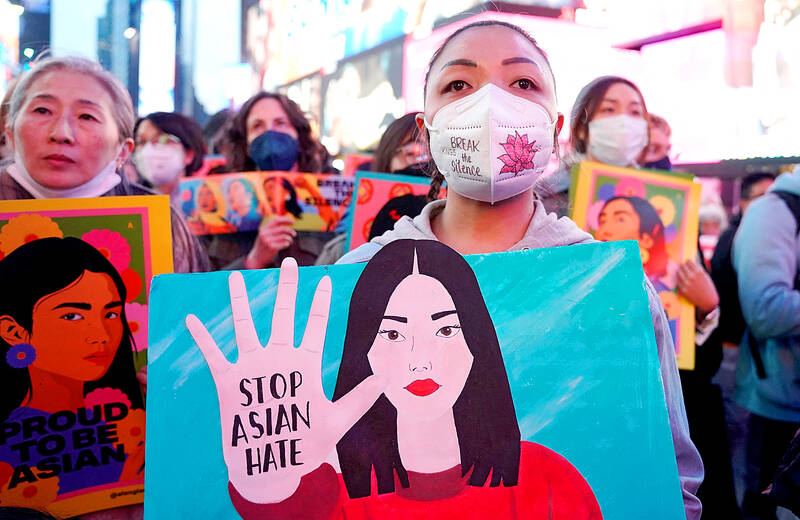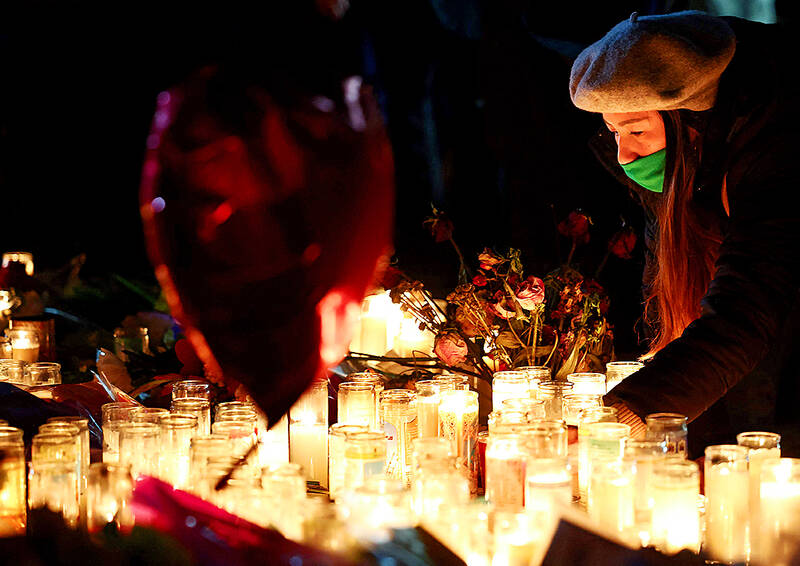For Kevin Leung, a head instructor at a kung fu school in Monterey Park in Los Angeles county, California, the past eight weeks have been a disorienting readjustment to normalcy.
His academy, the Siu Lum Pai Kung Fu Association, had for years held weekly classes at Star Ballroom Dance Studio, where he knew many members of the community. To combat the rise in anti-Asian violence during the pandemic, Leung also led many free self-defense classes there for Asian seniors.
But since a shooter opened fire at the ballroom on Lunar New Year in January, killing 11 people, Leung has been questioning the effectiveness of community-led safety initiatives — often those protecting the most vulnerable members of the group — in the absence of more stringent gun control policies.

Photo: AFP
“We trained ourselves and put ourselves out there in the community to be more vigilant,” he said. “But even with all the preparation in the world, someone kinda comes in with a gun, what can you do?”
STRICTER GUN LAWS
Nearly two months after back-to-back shootings in Monterey Park and Half Moon Bay, California, left 18 people — most of them senior citizens of Asian descent — dead in less than 48 hours, Asian American organizers, gun owners and gun control advocates are divided over how to address the twin rise of gun violence and gun ownership in their community. Both perpetrators, who were also Asian immigrants, were among the oldest mass shooters in US history.

Photo: AFP
Even before the shootings, more than two-thirds of Asian Americans in the state said they were worried about gun violence, the highest level among all racial groups, according to the 2021 California Health Interview Survey. Only one-third of whites, by contrast, responded similarly. Nearly half of Black and Asian American teens expressed concern about being victims of gun violence. Asian Americans have also expressed strong support for stricter gun laws.
But it hasn’t always been this way. Po Murray, the co-founder of the national gun control advocacy group Newtown Action Alliance, said that historically, gun deaths have been lower among Asian Americans, who therefore haven’t been vocal about gun control on a national scale — nor seen it as an issue that affects them.
“I think things have started to change over the last few years since we’ve become targets of gun violence,” she said, noting the sharp rise of anti-Asian hate crimes as well as a series of high-profile mass shootings.
Some experts say Asian Americans’ growing familiarity with gun violence is also a sign of assimilation. Though countries like South Korea and China reign supreme at shooting sports, they’ve also placed heavy restrictions on civilian gun ownership.
Newtown Action Alliance, along with the progressive groups AAPI Victory Alliance, MomsRising and Chinese for Affirmative Action, formed the AAPI Against Gun Violence coalition to engage the Asian diaspora on the issue of gun violence prevention. The groups have been leading efforts to ban assault weapons and install safeguards like universal background checks and Ethan’s Law, which requires gun owners to keep firearms stored.
Joe Biden visited Monterey Park last week to meet with the families and victims of the shooting and announce his executive order aimed at expanding background checks before firearm sales. At a more local level, the Democratic state senator Dave Min, vice-chair of the Asian and Pacific Islander legislative caucus, introduced legislation last month prohibiting banks with ties to firearm manufacturers from operating in the state, and another requiring federally licensed gun sellers to take an annual training course on “responsible sales practices.”
But some Asian American gun owners see these actions as political posturing that doesn’t reflect the concerns of community members. In Monterey Park, residents and business owners told the Guardian that they were “relieved” the attack wasn’t racially motivated, and argued that gun control legislation would not prevent all attacks.
Ray Kim, founder of the Facebook page Asian American Gun Owners of California, an affinity group with more than 8,000 members, said that violence against Asian seniors and women was being used to justify what he called “the ‘ban AR-15’ narrative.”
Since he founded the group in 2020, Kim said, it had experienced three notable jumps in membership during waves of anti-Asian violence. The first was at the start of the pandemic shutdown; the next was during the George Floyd protests; and finally, after the killing of a Thai elder, Vicha Ratanapakdee, in San Francisco in February 2021.
ANTI-ASIAN VIOLENCE
Asian Americans bought guns in record numbers over the past three years, a phenomenon fueled largely by a rise in anti-Asian violence, according to the trade organization National Shooting Sports Foundation. Asian Americans who experienced or witnessed increased acts of racism during the pandemic were more likely to buy firearms for self-defense, found a peer-reviewed study from the University of Michigan and Eastern Michigan University.
“We have to make extra effort to get professionally trained and seek proper ways to adopt the right cultural attitude toward firearm ownership,” Kim said.
For Tom Nguyen, founder of the firearms academy LA Progressive Shooters, the shootings in California reflect a burgeoning mental health crisis affecting Asian immigrant seniors, a demographic that’s been traumatized by wave upon wave of violence.
Calling for tighter gun laws, he said, felt like the “predictive” response from politicians after such tragedies. New restrictions on permits to carry concealed weapons in public, he said, wouldn’t stop people who have no intention of following the law — but would stop gun owners from “exercising their rights to protect themselves.”
Nguyen said he expected interest in his academy to grow in the coming weeks, as it often does after high-profile shootings. Many of his Asian students, he said, had bought their first guns over the past couple of years because they felt powerless amid a rise in homicides and violent crime.
“They tell me, ‘I need to do something to protect myself and my family,’” he said.
When Brittney Au founded Compassion in SGV, a volunteer group that provided chaperone and self-defense services for Asian seniors in San Gabriel Valley, it never occurred to her that the people she was protecting from racial violence would be the targets — and perpetrators — of mass shootings.
WAKE-UP CALL
For Au, the tragedies in Monterey Park and Half Moon Bay were not only shocking, but also a wake-up call that Asian Americans should be more proactive about fighting for stricter gun control measures.
“It’s way too easy to buy a gun and it shouldn’t be that way,” she said. “It shouldn’t be easier to buy a gun than it is to buy over-the-counter medication.”
Murray, of Newtown Action Alliance, said that increasing Asian American gun ownership was a concerning trend, as research has linked gun ownership at home to an elevated risk of suicide.
Murray said the AAPI Against Gun Violence coalition had been working on educating Asian Americans about the dangers that guns present to their community. Part of that education, she said, was shining a light on how the gun lobby has exploited a collective fear of hate crimes to increase profits.
From 2015 to 2019, more than 3,000 Asian Americans died in firearm suicides, homicides and accidental shootings. The back-to-back attacks last month follow a long list of mass shootings targeting Asian victims, from the 1989 elementary school shooting in Stockton, California, that left five refugee children dead, to the 2021 Atlanta spa massacre that left eight women dead, including six of Asian descent.
“What’s to be expected is that as more and more guns seep into all our communities, there will be more gun deaths and injuries,” she said.

The canonical shot of an East Asian city is a night skyline studded with towering apartment and office buildings, bright with neon and plastic signage, a landscape of energy and modernity. Another classic image is the same city seen from above, in which identical apartment towers march across the city, spilling out over nearby geography, like stylized soldiers colonizing new territory in a board game. Densely populated dynamic conurbations of money, technological innovation and convenience, it is hard to see the cities of East Asia as what they truly are: necropolises. Why is this? The East Asian development model, with

June 16 to June 22 The following flyer appeared on the streets of Hsinchu on June 12, 1895: “Taipei has already fallen to the Japanese barbarians, who have brought great misery to our land and people. We heard that the Japanese occupiers will tax our gardens, our houses, our bodies, and even our chickens, dogs, cows and pigs. They wear their hair wild, carve their teeth, tattoo their foreheads, wear strange clothes and speak a strange language. How can we be ruled by such people?” Posted by civilian militia leader Wu Tang-hsing (吳湯興), it was a call to arms to retake

This is a deeply unsettling period in Taiwan. Uncertainties are everywhere while everyone waits for a small army of other shoes to drop on nearly every front. During challenging times, interesting political changes can happen, yet all three major political parties are beset with scandals, strife and self-inflicted wounds. As the ruling party, the Democratic Progressive Party (DPP) is held accountable for not only the challenges to the party, but also the nation. Taiwan is geopolitically and economically under threat. Domestically, the administration is under siege by the opposition-controlled legislature and growing discontent with what opponents characterize as arrogant, autocratic

When Lisa, 20, laces into her ultra-high heels for her shift at a strip club in Ukraine’s Kharkiv, she knows that aside from dancing, she will have to comfort traumatized soldiers. Since Russia’s 2022 invasion, exhausted troops are the main clientele of the Flash Dancers club in the center of the northeastern city, just 20 kilometers from Russian forces. For some customers, it provides an “escape” from the war, said Valerya Zavatska — a 25-year-old law graduate who runs the club with her mother, an ex-dancer. But many are not there just for the show. They “want to talk about what hurts,” she